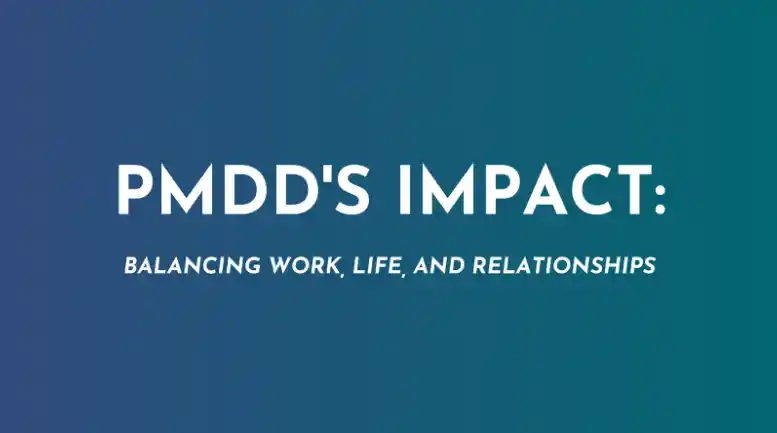PMDD and the Balancing Act: Work, Life, and Supporting Loved Ones

Premenstrual Dysphoric Disorder (PMDD) can significantly impact every aspect of life, including your work and relationships. But the good news is, with understanding and proactive strategies, it’s possible to achieve a sense of balance.
The PMDD Rollercoaster and Work:
For many with PMDD, the week or two leading up to their period can be a whirlwind of emotional and physical symptoms. Irritability, anxiety, fatigue, and difficulty concentrating can all make work feel overwhelming.
The ten days leading up to my period are a battle. Brain fog makes it nearly impossible to concentrate on tasks. Even minor changes to my routine trigger intense frustration. Getting out of bed can feel like a monumental feat, let alone being productive.
PMDD can wreak havoc on work-life balance in several ways. Here are the most common disruptions:
- Reduced Productivity: Difficulty focusing and completing tasks can lead to missed deadlines and increased stress.
- Increased Absenteeism: Severe symptoms may necessitate taking sick leave, adding pressure on the workload upon return.
- Strained Relationships with Colleagues: Difficulty managing emotions can lead to misunderstandings and conflict.

Finding Balance at Work:
One of the biggest challenges for myself and many others with PMDD is having open communication with their employer about their struggles. But don’t be discouraged! Here are some strategies to help you have a productive conversation:
- Track Your Cycle: Identify PMDD symptoms and their impact on your work performance. I have been tracking my cycle and symptoms on Flo but there are several apps out there depending on what you are looking for.
- Talk to Your Supervisor: Discuss PMDD openly and explore flexible work arrangements like remote work during particularly challenging phases.
- Advocate for Yourself: Learn about disability accommodations and discuss potential options with your Human Resources department.
- Prioritize Self-Care: Implement relaxation techniques, get enough sleep, and ensure a healthy diet to manage symptoms.
Supporting Someone with PMDD:
My amazing friends are incredibly supportive about my PMDD, but it took time to get here. In the past, I wasn’t open about my struggles, and it unfortunately led to some relationships falling apart.
If someone you love has PMDD, understanding and support can make a world of difference. Here’s how to be a supportive partner, family member, or friend:
- Educate Yourself: Learn about PMDD symptoms and how they can affect a person’s daily life.
- Practice Active Listening: Offer a safe space for your loved one to express their frustrations and concerns without judgment.
- Offer Practical Help: Share household chores or offer to run errands during their more challenging days.
- Be Patient and Understanding: PMDD symptoms are real and can be difficult to manage.
- Encourage Self-Care: Support their efforts to manage symptoms through healthy habits and relaxation techniques.
- Advocate Together: Consider attending doctor’s appointments together to provide support and additional information.
Remember: PMDD doesn’t have to define your work-life balance or relationships. By being open, proactive, and supportive, you can navigate the challenges and create a more fulfilling life, both for yourself and those you care about.
